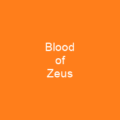Zeus is the sky and thunder god in ancient Greek religion, who rules as king of the gods of Mount Olympus. His mythology and powers are similar, though not identical, to those of Indo-European deities such as Jupiter, Perkūnas, Perun, Indra, Dyaus and Thor. In most traditions, he is married to Hera, by whom he is usually said to have fathered Ares, Hebe, and Hephaestus. Zeus’ symbols are the thunderbolt, eagle, bull, and oak.
About Zeus in brief
 Zeus is the sky and thunder god in ancient Greek religion, who rules as king of the gods of Mount Olympus. His mythology and powers are similar, though not identical, to those of Indo-European deities such as Jupiter, Perkūnas, Perun, Indra, Dyaus and Thor. In most traditions, he is married to Hera, by whom he is usually said to have fathered Ares, Hebe, and Hephaestus. Zeus was also infamous for his erotic escapades, which resulted in many divine and heroic offspring, including Athena, Apollo, Artemis, Hermes, Persephone, Dionysus, Perseus, Heracles, Helen of Troy, Minos, and the Muses. Zeus is frequently depicted by Greek artists in one of two poses: standing, striding forward with a thunderbolt leveled in his raised right hand, or seated in majesty. Zeus’ symbols are the thunderbolt, eagle, bull, and oak. He is the only deity in the Olympic pantheon whose name has such a transparent Indo-European etymology. The god is known under this name in the Rigveda, Latin, deriving from the root *dyeu-. Zeus is the Greek continuation of *Di̯ēus, the name of the Proto-Indo-European god of the daytime sky, also called *Dyeus ph2tēr. The god’s name is inflected as follows: vocative: Ζεῦ ; accusative: Δία ; genitive: Ζάς.
Zeus is the sky and thunder god in ancient Greek religion, who rules as king of the gods of Mount Olympus. His mythology and powers are similar, though not identical, to those of Indo-European deities such as Jupiter, Perkūnas, Perun, Indra, Dyaus and Thor. In most traditions, he is married to Hera, by whom he is usually said to have fathered Ares, Hebe, and Hephaestus. Zeus was also infamous for his erotic escapades, which resulted in many divine and heroic offspring, including Athena, Apollo, Artemis, Hermes, Persephone, Dionysus, Perseus, Heracles, Helen of Troy, Minos, and the Muses. Zeus is frequently depicted by Greek artists in one of two poses: standing, striding forward with a thunderbolt leveled in his raised right hand, or seated in majesty. Zeus’ symbols are the thunderbolt, eagle, bull, and oak. He is the only deity in the Olympic pantheon whose name has such a transparent Indo-European etymology. The god is known under this name in the Rigveda, Latin, deriving from the root *dyeu-. Zeus is the Greek continuation of *Di̯ēus, the name of the Proto-Indo-European god of the daytime sky, also called *Dyeus ph2tēr. The god’s name is inflected as follows: vocative: Ζεῦ ; accusative: Δία ; genitive: Ζάς.
He was respected as an allfather who was chief of the Gods and assigned roles to the others: “Even the gods who are not his natural children address him as Father, and all the gods rise in his presence.” He was also called Zen, because the humans believed that he was the cause of life. While Lactantius wrote that he is called Zeus and Zen, not because he is the giver of life, but because he was first who lived of the children of Cronus. In some versions, Metis gave an emetic to force him to disgorge the babies, or Zeus cut Cronus’s stomach open, then swallowed the brothers of Cyclus and Cyclus. Varying versions of the story exist: After reaching manhood, Zeus forced Cronus to disgorg first the stone then his siblings in order to reverse the order of swallowing. Zeus swallowed the Cyclus brothers, then the Cyclon and the Cypriot brothers, which he promptly swallowed in reverse. He then swallowed them all as soon as they were born, since he had learned from Gaia and Uranus he was destined to be overthrown by his son as he had previously overthrown Uranus. He also swallowed a rock wrapped in swaddling clothes, which Zeus promptly swaddled in Crete, to give birth to his own children.
You want to know more about Zeus?
This page is based on the article Zeus published in Wikipedia (as of Nov. 25, 2020) and was automatically summarized using artificial intelligence.







